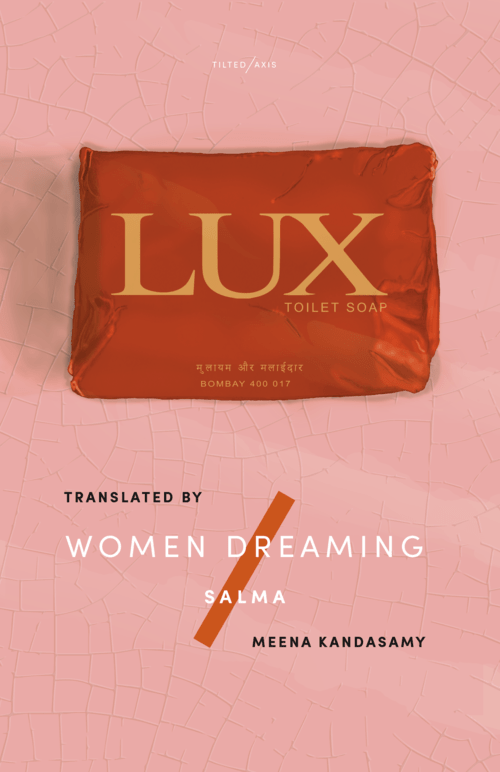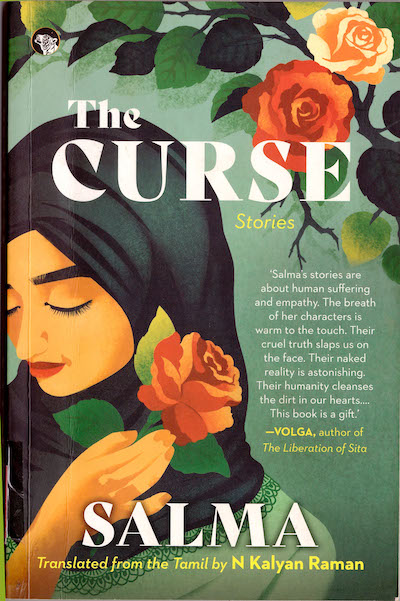SALMA (1968)
Born in 1968, Salma is a trailblazing Tamil poet, writer and social activist. She dropped out of school at the age of thirteen, in keeping with the rigid conventions of her cloistered Muslim community. Through her profound interest in literature and voracious reading, she struggled hard to win a place for herself as a writer and activist in an oppressive social milieu. The bold expression of female subjectivity and foregrounding of female desire in Salma’s first collection of poems, ‘Oru Malaiyuminnoru Malaiyum’ (2000), was something of a shock to the male-dominated Tamil literary world. Salma faced charges of obscenity and threats of violence. The astonishing success of the collection proved to be an enabling moment for women poets in Tamil Nadu. Her first novel ‘The Hour Past Midnight’ was widely acclaimed and translated into many languages.


THE DOOR LATCH
(Novel)
(AdaikkumThaazh)
Number of Words in Tamil: 35,500
AdaikkumThaazh, by the illustrious writer Salma, was published in Tamil in the year 2022.
Aptly borrowing a Thirukural phrase for its title, Adaikkum Thaazh spotlights the multi-dimensional latch that shackles an emotion as natural and as unfettered as love. Salma, through the life of Rasangam and his family, zooms into the harsh and perilous nature of inter-faith romantic relationships.
Rasangam’s ambitions for higher studies and a government job come crashing when circumstances force him into the role of a shop manager in his brother-in-law’s grocery store in a different village. He finds himself struggling to earn the respect of the society he finds himself entrenched in, which spares no opportunity to taunt him about his name, birth and to question his commitment to the faith. To add to it, he comes to know about the relationship between his brother-like cousin Hanifa and Chitra, the daughter of a Hindu farm hand. . Although Rasangam’s conservative Muslim family talks him out of it, Chitra’s untimely death brings more woes to the family. Meanwhile, Rasangam gets into a marriage of convenience and continues to struggle with his status in his village while getting drawn further into his religion. Years later, when his son becomes an adult, he too finds himself attracted to a Hindu fellow-student in college. How he navigates his relationship, the role his family plays in his decisions, how the society views inter-faith relationships especially with proselytization in the backdrop, are inquiries the author leaves us with at the end of the book.
An award-wining writer, Salma has experienced firsthand the overbearing restrictions prevalent in conservative religious families. She spotlights subtle misogynistic details in the conservative household and the hierarchies within through her very real and relatable characters. The treatment of Fathima, Hanifa’s sister whose husband abandons her after begetting a daughter, or a statement in passing by Rasangam to his wife Banu about covering herself ‘properly’ when out in public nods in this direction. Interestingly too, each of the female characters are rich and colourful in their portrayal, with much depth, both mentally and emotionally. The story also thoughtfully spans over two generations to highlight how the constraints prevail even in contemporary times. They tend to get more repressive as the rest of the world seemingly moves forward. AdaikumThaazh is riveting in its story, expressive in its details and deeply thought-provoking in its message.
THE HOUR PAST MIDNIGHT (Novel)
(IrandaamJaamankalinKathai)
Number of pages: 478
Rabia is young and growing up in a conservative, cloistered community in southern India. One day, she and her friends sneak off to the movies and are shocked by what they see on the screen. Caught on her return home, Rabia gets a beating from her mother, Zohra, who cries as she beats her daughter into submission, the only route to Rabia’s survival.
Firdaus is young and beautiful and of marriageable age. A groom is found for her, a wealthy man who lives and works abroad. On her wedding night, she takes one look at him and says, ‘I’m not going to live with you, don’t touch me!’ and then is shocked at her own behaviour. How could she have been so daring?
Inside their closed, male-dominated world, Rabia, Rahima, Zohra, Amina, Khadija, Firdaus, Nuramma and many others make their small rebellions and compromises. Friendships are made and broken, families come together and fall apart, and slowly, almost imperceptibly, changes creep in. Before they know it, the women’s lives have changed forever.


WOMEN, DREAMING
(Novel)
(Manamiyankal)
Number of pages: 288 in Tamil
This is a book about communion and friendship between women, set in a small village in rural Tamil Nadu. The women are of mixed religions and castes, and they sit together and chat for hours about their lives and feelings. It portrays the plight of Muslim women and the idea of a well-defined morality that suppresses the woman’s body and mind, desires and thoughts. In this book, morality has a different connotation. It’s all about love, heart and camaraderie. It asks how women can help each other and find joy in female companionship. These are women who have spent their lives in the shadows of fathers, brothers and husbands; being dutiful, raising children and going to temples and mosques, but whose inner lives are as rich and fruitful as their untold stories. Together, they open up to each other about womanhood, sexuality, and the dark secrets within the community. They talk often of love, sex and the vagaries of men, and share their secrets, their regrets and their often-outrageous stories. By turns revealing and hilarious, these are stories about the lengths to which some women will go to find a man, keep a man or, most importantly, keep up appearances. Full of surprises, this introduction to the private lives of some fascinating women, whose life stories and lovers will strike us as at once deeply familiar and profoundly different from our own, is sure to bring smiles of recognition to the faces of women everywhere - and to teach us all a thing or two. In Tamil, Salma’s works are considered feminist classics.
THE CURSE (Short stories)
(Saabam)
Number of pages: 192
‘Salma’s stories brush aside all niceties and cut a straight path to feminine interiority, shining a light upon the hypocrisy and injustice woven into the lives of women, and the painful outcomes for all.’
- ANNIE ZAIDI, Editor of Woman Unbound.
‘Richly layered and profoundly insightful, each story is intellectually provocative, brilliantly crafted and skillfully translated. Salma is a master storyteller who transforms ordinary lives into sagas of identity, gender and nationalism.’
- K.R. MEERA, Author of Hangwoman.


